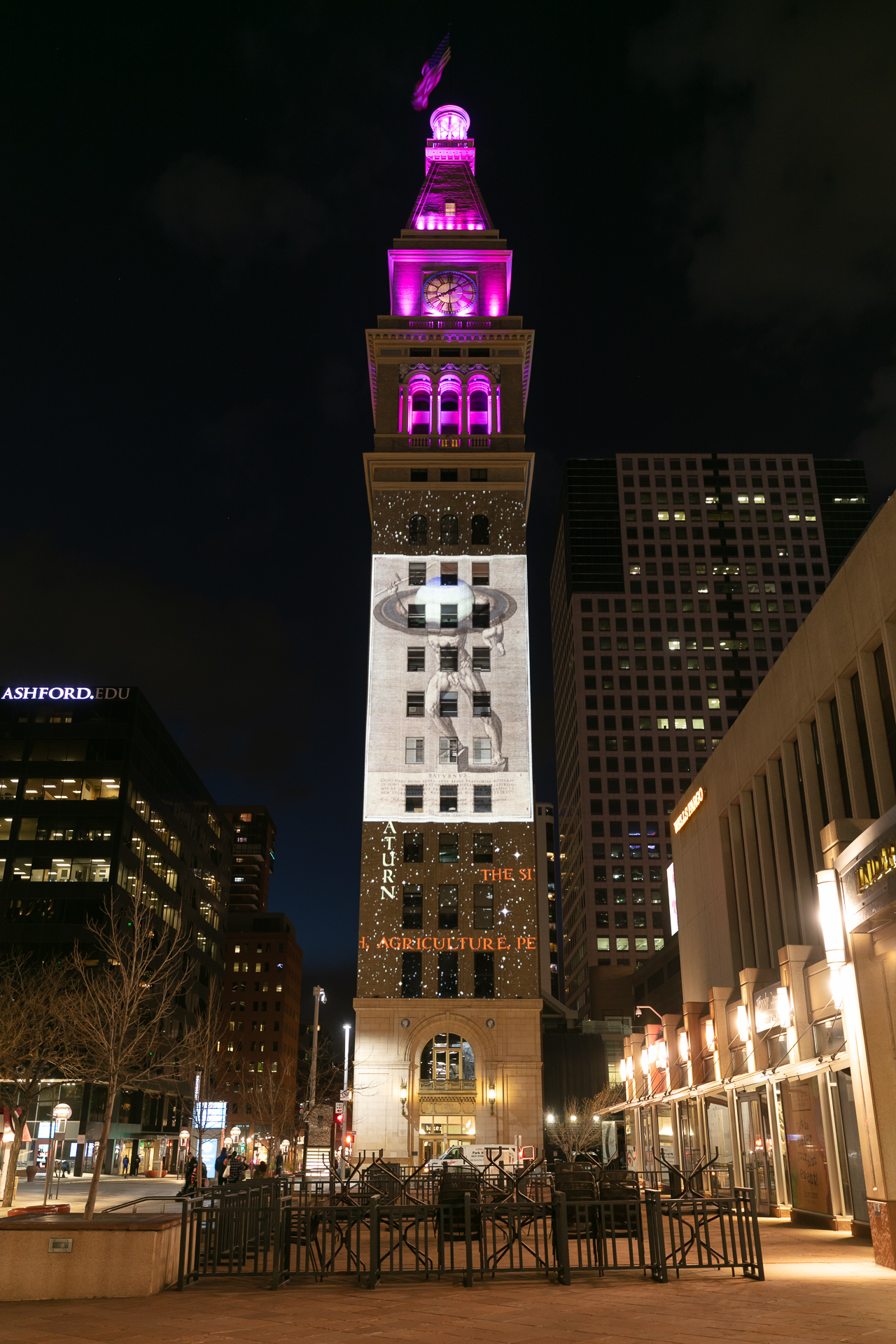Shadows of Saturdays Past
Part of a month long projection project on a historic clock tower in downtown Denver, USA organized by Black Cube during the month of April 2021.
Watch video here
Part of a month long projection project on a historic clock tower in downtown Denver, USA organized by Black Cube during the month of April 2021.
Watch video here


The Romans named the seventh day of the week Saturday after the planet Saturn, which in turn, was named after the god Saturn.
In honor of Saturn, the god of generation, dissolution, plenty, wealth, agriculture, periodic renewal and liberation, the Roman Empire celebrated the festivity of Saturnalia. For a week in December, social structures and hierarchy were overturned so slaves, freedmen and masters feasted, drank and partied together. They all wore colorful festive clothing and the freedman's felt cap to gamble and exchange gifts on equal footing.
As the pandemic keeps us socially distanced with the majority of events cancelled across the globe for what has been more than a full year now, i find myself more than ever feeling nostalgic for a time when we all could have danced together.
Tonight will be a shadow of Saturdays past.
“The first inhabitants of Italy were the Aborigines, whose king, Saturnus, is said to have been a man of such extraordinary justice, that no one was a slave in his reign, or had any private property, but all things were common to all, and undivided, as one estate for the use of every one; in memory of which way of life, it has been ordered that at the Saturnalia slaves should everywhere sit down with their masters at the entertainments, the rank of all being made equal.”
Justinus: Epitome of Pompeius Trogus' Philippic Histories
In honor of Saturn, the god of generation, dissolution, plenty, wealth, agriculture, periodic renewal and liberation, the Roman Empire celebrated the festivity of Saturnalia. For a week in December, social structures and hierarchy were overturned so slaves, freedmen and masters feasted, drank and partied together. They all wore colorful festive clothing and the freedman's felt cap to gamble and exchange gifts on equal footing.
As the pandemic keeps us socially distanced with the majority of events cancelled across the globe for what has been more than a full year now, i find myself more than ever feeling nostalgic for a time when we all could have danced together.
Tonight will be a shadow of Saturdays past.
“The first inhabitants of Italy were the Aborigines, whose king, Saturnus, is said to have been a man of such extraordinary justice, that no one was a slave in his reign, or had any private property, but all things were common to all, and undivided, as one estate for the use of every one; in memory of which way of life, it has been ordered that at the Saturnalia slaves should everywhere sit down with their masters at the entertainments, the rank of all being made equal.”
Justinus: Epitome of Pompeius Trogus' Philippic Histories

“clock-watching is an experimental group exhibition that subverts the measurement of time on a historic clock tower in downtown Denver. Rather than keep time in the traditional sense—by seconds, minutes, and hours—this exhibition explores tracking time by the day of the week through a series of newly commissioned nighttime video projections. Collectively, these digital artworks acknowledge the perception of time slowing down during the COVID-19 pandemic.
The month-long exhibition features a 7-day rotation of videos by seven artists, which explore an array of subjects—from abstract, painterly landscapes that unveil a slow, organic passage of time to a longing reflection on pre-pandemic weekend partying. The animated, digital artworks are projected nightly onto the clock tower’s facade on a set, looped schedule that correspond to a particular day of the week. In turn, the artworks generate an unconventional notion of time that highlights our standardized and cyclical relationship with the 7-day week. clock-watching offers a new meditation each day and examines our connection to time at a moment when our day-to-day has radically changed.”
Black Cube
Photo and video credit: Wes Magyar. Courtesy of Black Cube and Night Lights Denver.
The month-long exhibition features a 7-day rotation of videos by seven artists, which explore an array of subjects—from abstract, painterly landscapes that unveil a slow, organic passage of time to a longing reflection on pre-pandemic weekend partying. The animated, digital artworks are projected nightly onto the clock tower’s facade on a set, looped schedule that correspond to a particular day of the week. In turn, the artworks generate an unconventional notion of time that highlights our standardized and cyclical relationship with the 7-day week. clock-watching offers a new meditation each day and examines our connection to time at a moment when our day-to-day has radically changed.”
Black Cube
Photo and video credit: Wes Magyar. Courtesy of Black Cube and Night Lights Denver.